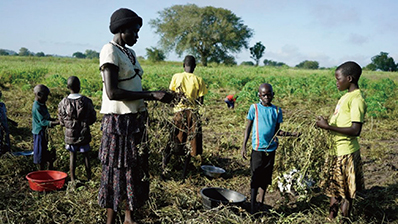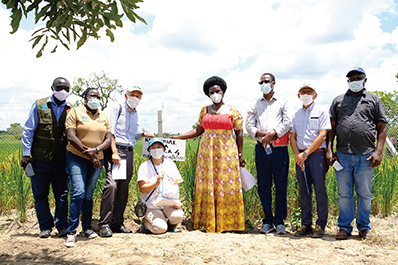Stories from the Field 2Public nomination
Japanese Cooperation Boosting Initiatives in Uganda, Africa’s Largest Refugee-Hosting Country
—UNHCR activities—

A South Sudanese female refugee working hard on rice-farming, taking care of 19 children separated from their parents in conflicts (Photo: UNHCR)

Ms. TAKASHIMA Yumiko, who says “sustainable initiatives truly are the key,” visiting a field of NERICA cultivated by refugees (Fourth from the left) (Photo: UNHCR)
Uganda is located in the eastern part of Africa, also known as “the Pearl of Africa” for the beauty of its nature. Over the years, Uganda has been welcoming many refugees and has seen many influxes of refugees fleeing from neighboring countries such as South Sudan and the Democratic Republic of the Congo, where instability persists.
With the cumulative number of refugees in Uganda reaching approximately 1.4 million at the end of 2020, Uganda is currently Africa’s largest refugee-hosting country. The refugee status recognition rate in Uganda was 95% prior to the COVID-19 pandemic (2019), and there are 13 refugee settlements across the country by the initiative of the Government of Uganda. Efforts to meet the needs of refugees, such as land allocation, freedom of movement, and providing livelihood opportunities, have also been strengthened, and the program is recognized worldwide as a successful example of refugee integration.
Coordination with a variety of partners is essential for the refugee assistance in Uganda. In response to the growing environmental risks surrounding refugees under the COVID-19 pandemic, the UNHCR cooperates with a number of Japanese actors, including the Government of Japan, JICA, and NGOs across a wide range of fields to realize the “whole-of-society approach,” a concept set out in the Global Compact on Refugees (GCR).*1
One example is the “Promotion of Rice Development (PRiDe) Project,” implemented in cooperation with JICA. Previous efforts from JICA, developed as rice-farming promotion, have been expanded to support refugees in cooperation with UNHCR since 2014. The project not only helped promote NERICA (New Rice for Africa),*2 which is resilient against drought and thus suitable for the African climate, but also provided training on rice-farming to both refugees and host communities, benefitting around 1,111 households (approximately 5,000 people) in 2021. The economic independence gained through the cultivation of NERICA has boosted the self-confidence of the refugees, and many of them say it has changed their lives.
Such collaboration between JICA and international organizations has contributed to strengthening the Humanitarian-Development Nexus that aims to build a seamless coordination between humanitarian assistance and development cooperation (see Part II-2, 2-2 (1) for details). Moreover, to meet the diverse needs of refugees such as medical care, education, water supply, and livelihood improvement, UNHCR works to deliver support to each and every refugee for their better futures while strengthening its coordination with Japanese companies, NGOs, and others.
Many Japanese staff members also work actively in the field of UNHCR refugee assistance. Assistant Protection Officer Ms. KOBAYASHI Akiko at the Yumbe Office in Uganda, who has worked in Uganda for more than three years, said, “I often find myself inspired by the refugees who never lose their hope and do their best to thrive even though they have been forced to flee their homes and live in difficult circumstances.”
Ms. TAKASHIMA Yumiko, Principal Risk Management and Compliance Advisor at the UNHCR Country Office in Uganda, said, “I would like more people to know about not only the challenges refugees in Uganda face but the various forms of assistance being delivered from the people of Japan. And I hope you will join us in thinking about what more Japan can do to help.” It is expected that cooperation with Japan’s expertise will continue to expand to support refugees in the future.
*1 Adopted by the UN General Assembly in December 2018.
*2 See the glossary.
<< Previous Page Next Page >>
Main Text | Reference Statistics | Stories from the Field | Master Techniques from Japan to the World | ODA Topics
